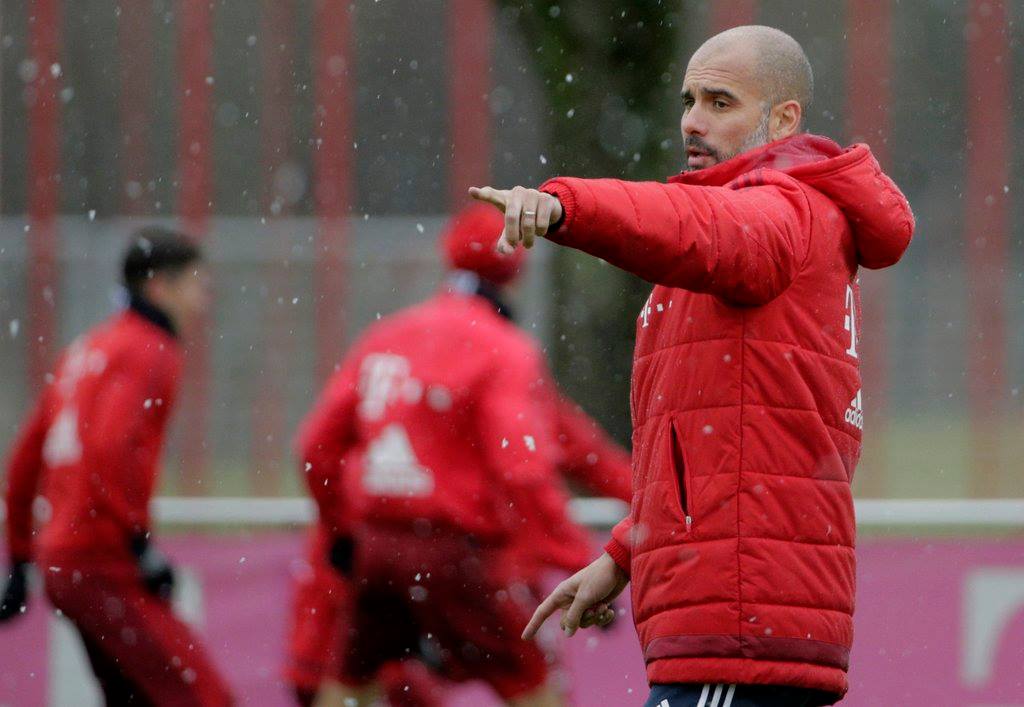Can Pep Guardiola’s stay in Germany be really labelled a success?

In the not so obvious words of Maureen O’Hara “In the beginning it was all black and white”. For Pep Guardiola, that was Barcelona. Legendary status at the Catalonian club, and then with the world at his feet, he walked away. Away from Barcelona into Bayern’s dressing room, and over time the tints of grey on his once-shining legacy have been difficult to overlook.
As the sun sets on the former Barcelona gaffer’s time in Bavaria, Manchester City fans can start to smack their lips at the prospect of having one of the world’s best managers prowling on the Eastlands touchline. But before he does that, like Michael Owen would say “he has to leave Bayern Munich!”, and since he’s not doing that until May, the jury is still out on his stint in Germany, and every result will be scrutinized with daggers out and many a question unanswered. Has his reign taken Bayern Munich to a different level from when he took them on after Jupp Heynckes decided to hang his managerial boots, or have they remained where they were? Or maybe even regressed?
This might appear to be a simple yes-no question, but the moment you start answering it you see the different layers to it and figure out how tricky it gets with each passing layer. Most fans and pundits will probably label it a success just because of the Guardiola factor and the slight bias that comes with a legendary name as his, but that would be oversimplifying things. Looking at results alone, which his side have earned, would be like judging a book by its cover, not telling the entire story, or probably even the half of it. Winning and losing could be the defining markers from a hawk-eye view, but when judging a manager’s tenure at a club, a lot of other factors need to be accounted as well as the circumstances in play. How strong or viable the bridge built across the past and the future is, of the said club, plays a key role in reaching a conclusion to round off what the manager has accomplished.
Pep Guardiola has won the Bundesliga twice in two seasons and is well on course to claim a third after the draw with Dortmund left them five points clear at the top. He has also won a FIFA Club World Cup, thanks partly to Heynckes, whose Champions League-winning Bayern side Pep inherited. He has also won the DFB Pokal once, when the Bavarians ousted Borussia Dortmund 2-0 in 2014, but the German Supercup has eluded the Spanish manager every season, losing to Dortmund twice and Wolfsburg once under his guidance.
However, looking with the lens of Bayern Munich’s lofty standards, these results, that too on the trot, begin to look unacceptable. Even the league titles and the DFB-Pokal appear to be heirlooms they were expected to hold on to, and hence they don’t get credited as much. Bayern’s hegemony in Bundesliga is well-known, and it is expected that the only yardstick that the fans can measure them agaisnt is Europe. Former coach Jupp Heynckes had set the bar high in this regard, winning the Champions League and thus leaving huge boots to fill. Naturally people expected Guardiola to repeat the feat, especially with his pedigree and Bayern’s winning side seeming a match made in heaven. But alas, Guardiola and Bayern failed, exiting the competition at the semis to Real Madrid. Many conspiracy theories went around as to how it was the first season, expecting Bayern to show signs of improvement in the second, with a more-settled squad cherry picked by Guardiola.
There floats an argument that succeeding success is the tougher challenge than being successful the first time. So Pep has ticked most of those boxes one would think. A lot of managers have been successful in the history of football but not many have had sustained success. That is why any other manager at Bayern with the same squad, most likely would not have have had the same success as Pep did and would have faced a lot of difficulties in keeping up with the past success. The burden of expectations would have been crippling enough to put anyone under incredible amount of pressure, and Pep deserves credit for coping well. He has come in, added stability to the side, imposed his playing style over the side and has, by surgically picking it apart, fine-tuned it further. The Bayern side are now adhering to Guardiola’s micro-tactics and unconventional formations and evolving in the process, both individually and as a team.
Credit must also go to the Spanish gaffer for getting on board players like Kingsley Coman, Joshua Kimmich, Juan Bernat and Sebastian Rode, all young and brimming with raw talent and energy, ready to carry the torch forward once the likes of Arjen Robben and Franck Ribery end up succumbing to the pangs of age. Douglas Costa has been blowing oppositions away with his flair and panache since joining from Shakhtar Donetsk in the summer. Kingsley Coman recruited from Juventus has also shown glimpses of explosive pace and pleasing-on-the-eye football. These two players look the best contenders to replace the Rob-bery du,o who have now tortured defenses for a decade, being the primary weapons in attack since Louis van Gaal’s stint.
But Guardiola has also made some debatable transfer decisions. Toni Kroos was offloaded to Real Madrid, while Bastian Schweinsteiger was sold to Manchester United - both Bayern youth and very popular among the Allianz faithful. Kroos was replaced with the signing of Xabi Alonso, while Arturo Vidal was brought in to replace the German skipper. More so, Mehdi Benatia was signed from Roma when Bayern needed a quality center half in the summer of 2014, as the injury-prone Holger Badstuber could no longer be entrusted with a starting spot. Thiago Alcantara, the exciting yet composed midfielder from Barcelona, followed his mentor and has been a brilliant purchase.
Guardiola has also transformed Lahm into a more complete player than he was. Someone who can play as a defensive midfielder too now, Lahm has Guardiola to thank for the improvement that has come in the physical side of his game. Guardiola has extracted the most out of other ageing players too such as Rafinha, Schweinsteiger and Claudio Pizarro. Guardiola’s tactical astuteness has helped prolong quite a few careers clearly.
And when it comes to winning the Champions League, you have to take a look at the accolades other prominent managers have won. Sir Alex Ferguson won the Champions League just twice during his 26-year long stint at Manchester United. Arsene Wenger has never won the Champions League and is into his 20th year of Arsenal management. The only manager who has achieved this feat more than twice is the one earmarked to replace Pep - Carlo Ancelotti. Possibly, that could be one of the reasons the Bayern management chose the Italian.
The fact that Guardiola has failed to win the Champions League is a failure on his part but isn’t something that is strange. The man has built the foundation of a club that consisted of a core that was full of ageing players and has overhauled it by bringing in young players to replace them, passing on the baton successfully. Pep might not have filled the trophy cabinet to the brim, but he has fine-tuned the identity of the club in a manner that no other manager could probably have. When a manager’s contributions at a club aren’t decided solely by how much or what he has won and lost, one will find Guardiola’s stint at Bayern Munich not only productive and successful but also one that laid a blueprint for a bright and sustained future - the hallmark of a great manager.

Comments
Sign up or log in to your account to leave comments and reactions
0 Comments